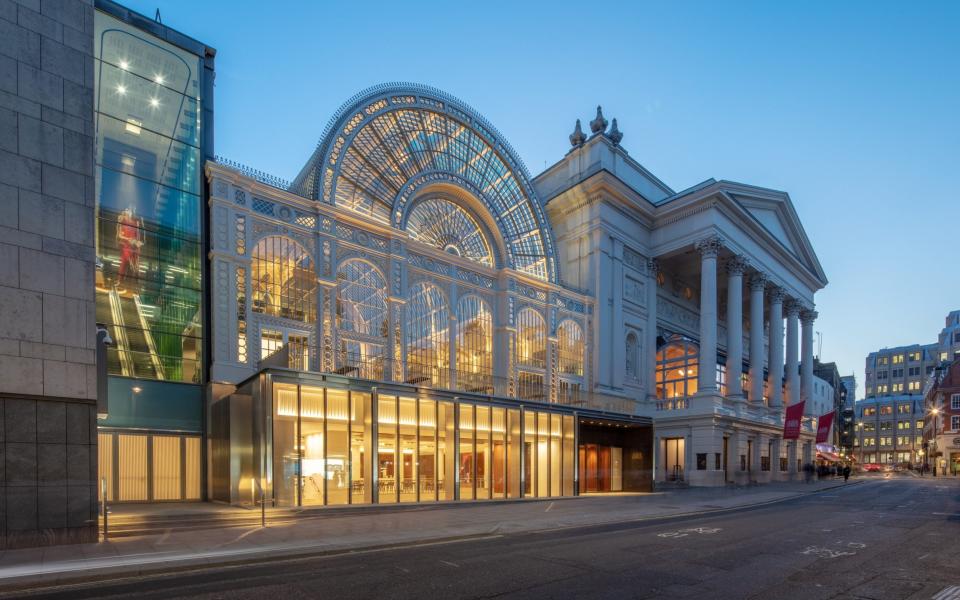‘Brutal shake-up’ will slash arts funding and force creative bodies out of London

The English National Opera is being forced to leave London as part of a controversial drive to “level up” the arts as critics accused the Government of cultural vandalism.
Millions of pounds in funding will be diverted from some of the country’s most cherished theatres, including the National Theatre and Royal Opera House as part of a “brutal” shake-up.
Critics said the move would “wreak long-lasting damage” as it emerged that organisations that will benefit include a gallery that “focuses on the fluidity of identity” and an LGBT festival that puts on drag artist cabarets.
But the decision by the publicly funded Arts Council England was welcomed by regional arts leaders, who said people all over the country would benefit from the redistribution of funds that had been disproportionately concentrated in the capital.
‘Almost 100 years of tradition and culture and loyalty gone’
The English National Opera has been told it must move to Manchester after losing its entire £12.6 million a year grant, which will be replaced by a £17 million three-year fund to pay for the transition.
Its chief executive Stuart Murphy said: “It’s a really difficult day and a terrible decision. There’s no getting away from the fact that this is a brutal cut.”
In an email to staff of the English National Opera, which is based at the Coliseum theatre, he said that he had been given no warning of what was coming, and that Arts Council England had “specifically told” the English National Opera “not to plan for moving out of London”.
He told Times Radio: “We have a big London base that will now have to be pulled apart. That’s almost 100 years of tradition and culture and loyalty. That’s just gone.”
Another big loser is London’s Donmar Warehouse theatre company, which will lose its entire Arts Council funding.

James Bond director Sir Sam Mendes, who was its founding artistic director, described it as “a short-sighted decision that will wreak long-lasting damage on the wider industry”.
He said: “The Donmar has been at the heart of British theatre for three decades, and has a hard-won legacy of punching well above its weight in both its ambition and reach.
“It is a world-renowned and hugely influential theatre, and the UK cannot afford to put it at risk.”
Game of Thrones actor Kit Harrington, who appeared at the Donmar as Henry V earlier this year, warned it may deny young people “opportunities to see live theatre like this in the future”.
Under the new funding package, which runs from 2023 to 2026, a total of 990 museums, libraries and other other art organisations will share in a £446 million pot, up from 714 organisations previously.
London faces more than £50 million worth of cuts and ministers had directed that a greater proportion of the £152 million allocated for the city goes to its outer boroughs.
Philippa Childs, head of the broadcasting union Bectu, said the body is “deeply concerned” by the impacts of the announcement. She said: “We are shocked and dismayed at the Government cuts to London’s arts funding.
“If the UK has an ambition to continue to be a leading cultural centre we must avoid politically motivated decisions that hinder rather than help support and underpin the fragile ecology of the cultural sector.”

The creative industries are one of Britain’s biggest exports, as well as helping to attract millions of tourists each year, and critics warned that the Arts Council changes could threaten that if the quality of London theatre and arts deteriorates.
Others braced for severe cuts include the Royal Opera House, which will see its yearly funding fall by £2.5 million under the new settlement.
It said that it is facing “significant financial challenges” and will “do whatever we can to remain at the heart of the cultural life of the nation”.
Two world-famous London orchestras, the Philharmonic and the Symphony, will both face 10 per cent decreases in their payments.
Funding for the Southbank Centre will be cut by £1.5 million, and for the National Theatre it will fall by £500,000 a year.
Meanwhile, the English National Ballet is set to lose £200,000 annually.
‘We had to make some invidious choices’
Sir Nicholas Serota, the chairman of Arts Council England, said the organisation had been “instructed” by the Government to shift funding out of London.
Speaking at a press conference he admitted that as a result it had “simply had to make some invidious choices about where we fund the most”.
Sadiq Khan, the Mayor of London, said London’s arts scene would be “devastated” by the cuts which “could not have come at a worse time”.
“Arts organisations already face a triple whammy of spiralling operating costs, soaring energy bills, and the impact of both the pandemic and the cost of living crisis on audience figures,” he said.
“London’s cultural organisations contribute billions and power our capital’s economic comeback as well as the wider UK economy every year which is why they need continued investment.
“A strong London equals a strong UK, that’s why I am urging the Government to think again and reconsider the consequences of these detrimental cuts.”
Some of the winners from the new funding package are likely to attract controversy.
Receiving funding for the first time is Mimosa House in London’s Holborn, which aims to “support dialogue between intergenerational women and queer artists”.
The gallery describes itself as “a safe and empowering space which focuses on the fluidity of identity and recognises the need for change”.
Its exhibitions have included the Mother Art Prize, which it described as “an international prize for self-identifying women and non-binary visual artists with caring responsibilities”.
Its current exhibition, by multimedia artist Hannah Catherine Jones, aims to “explore how queer, diasporic folx can move through the oftentimes traumatic complexities of contemporary life to continue on a trajectory of individual and collective healing”.
The gallery is receiving £100,000 from Arts Council England.

Also among the winners was Newcastle-based dance studio Company of Others which will receive Arts Council England funding for the first time, getting £220,000.
It says: “We collaborate with people who have experience of being ‘othered’ by the society we live in, to co-create dance theatre experiences which highlight and share stories of the human experience through their lens.”
One video posted on the charity’s website shows people wading into the North Sea in their clothes and dancing in waist-high water.
There is also an increase in funding for Liverpool-based Homotopia, which runs a Queer the City project to “present an LGBTQIA focus on areas of the city not usually viewed as queer”.
It put on a cabaret last year hosted by a drag artist called Filla Crack.
Culture Secretary defends funding allocations
Michelle Donelan, the Culture Secretary, defended the package and said it would “spread more money to more communities than ever before”.
She said it “will see organisations in places all too often overlooked get the support they need to transform access to the arts for everyone - no matter where they live”.
When Boris Johnson explained the details of his levelling up agenda last year, he assured voters in the south that the policy did not mean “robbing Peter to pay Paul”.
Levelling up, he said, “is not a jam-spreading operation. It’s not zero sum, it’s win-win”.
Sixteen months and two prime ministers later, the arts sector will claim that promise no longer holds true.
As part of proposed plans, Arts Council England announced a £43.5 million investment to organisations outside London contributing to levelling up for the next three years. It will see a 95 per cent increase in investment across 78 designated areas, towns and cities, including Blackburn, North Devon and Mansfield.
A total of 276 institutions that were not previously part of the Arts Council England funding programme will now be getting money.
The Royal Shakespeare Company, based in the playwright’s hometown of Stratford-upon-Avon, will get an extra £275,000.

Elsewhere in the West Midlands, the Birmingham Royal Ballet is in line for a £145,000 a year funding uplift.
And the Black Country Living Museum, where scenes for the BBC series Peaky Blinders are filmed, is getting a 40 per cent increase in its payment.
One of the biggest winners is the Belgrade Theatre in Coventry, which is seeing its annual funding go up by almost 30 per cent.
In the North West the world-famous Blackpool Illuminations will receive arts cash for the first time, with £225,000 a year earmarked.
Opera North, which is based in Leeds, will get an extra £290,000 while the Northern Ballet is set to receive £177,000 more.
In the South West there is new funding for North Devon theatres, which has been allocated £1 million annually.
As part of the levelling up drive, 24 cultural organisations are receiving more cash after volunteering to move out of London to other parts of the country.
They include the British Youth Music Theatre, which is seeing its funding almost doubled from £79,000 to £151,000 a year.
The English Touring Opera is also relocating from the capital, with its budget going up by £400,000 a year to £2.1 million.

 Yahoo News
Yahoo News 
